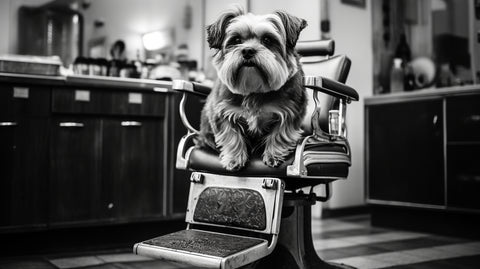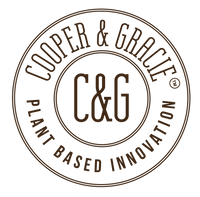What Are Ingrown Hairs?
Ingrown hairs are a common occurrence in humans, but can they affect our canine buddies as well? To answer this question, we must first grasp the concept of ingrown hairs.
An ingrown hair is a hair that curls and grows back into the skin instead of rising up from the hair follicle. This often leads to inflammation, redness, and discomfort, which can be painful for humans. But can dogs experience a similar issue?

Understanding Canine Hair Growth
Before we dive into whether dogs can get ingrown hairs or not, it's essential to comprehend how their hair growth differs from ours. Unlike humans who have one type of hair, dogs possess different types of hair: primary, secondary, and whisker hairs. Each type serves a specific purpose and undergoes a different growth cycle. This distinction raises the question of whether ingrown hairs are even possible in dogs.
Can Dogs Get Ingrown Hairs?
The short answer is yes, dogs can get ingrown hairs, but it's relatively uncommon compared to humans. The reason behind this rarity lies in their hair texture and growth patterns. Canine hair is typically coarser and straighter, which makes it less likely to curl back into the skin. However, certain factors can increase the likelihood of ingrown hairs in dogs.
Factors that May Lead to Ingrown Hairs in Dogs
-
Curly Coats: Breeds with curly or wiry hair, such as poodles or bichon frises, are more prone to ingrown hairs due to the hair's tendency to curl back into the skin.
-
Improper Grooming: Inadequate grooming practices, such as not brushing your dog regularly, can lead to matting and tangling of the fur, creating conditions conducive to ingrown hairs.
-
Skin Infections: Skin conditions like folliculitis can disrupt the natural hair growth pattern and increase the likelihood of ingrown hairs.
Recognising Ingrown Hairs in Dogs
Identifying ingrown hairs in dogs can be a bit tricky since they are not as common as in humans. However, there are some signs to watch out for:
-
Redness and Swelling: If you notice localised redness and swelling on your dog's skin, it might be a sign of an ingrown hair.
-
Itchiness and Discomfort: Dogs with ingrown hairs may scratch or bite the affected area due to the discomfort it causes.
-
Pustules or Bumps: Ingrown hairs can sometimes lead to pustules or small bumps on the skin's surface.
Preventing Ingrown Hairs in Dogs
Prevention is always better than cure, and the same applies to ingrown hairs in dogs. Here are some preventive measures you can take:
-
Regular Grooming: Brush your dog's coat regularly to prevent matting and tangling.
-
Proper Hygiene: Maintain good hygiene for your dog's skin and coat, which includes regular baths and cleaning. (Check out our natural dog shampoos here).
-
Healthy Diet: A balanced diet can contribute to healthy skin and hair growth. Discover superfoods for dogs.
Conclusion
In conclusion, while it's not common for dogs to get ingrown hairs, it is possible, especially in certain breeds and under specific conditions. Understanding your dog's unique hair characteristics and practicing good grooming and hygiene can go a long way in preventing ingrown hairs and ensuring your furry friend's overall well-being.
FAQs (Frequently Asked Questions)
-
Can all dog breeds get ingrown hairs?
- No, not all dog breeds are equally prone to ingrown hairs. Breeds with curly or wiry hair are more susceptible.
-
How can I treat an ingrown hair on my dog?
- If you suspect your dog has an ingrown hair, it's best to consult your veterinarian for proper diagnosis and treatment.
-
Is it painful for dogs to have ingrown hairs?
- Yes, ingrown hairs can cause discomfort and itchiness for dogs, similar to how they affect humans.
-
Can ingrown hairs in dogs lead to more serious skin issues?
- In some cases, untreated ingrown hairs can lead to skin infections or other dermatological problems, so it's essential to address them promptly.
-
Are there specific grooming products that can help prevent ingrown hairs in dogs?
- While there are no specific products, regular brushing and maintaining proper hygiene are key to preventing ingrown hairs in dogs.
Join Cooper and Gracie in Caring for Your Canine Companion!
At Cooper and Gracie, we are not just a brand; we are passionate pet lovers just like you. We understand the deep bond you share with your furry friend and the importance of their well-being. That's why we're dedicated to providing you with the finest products and expert advice to ensure your dog leads a healthy and happy life.
In the spirit of our commitment, we invite you to explore our range of grooming products, designed to keep your dog's coat in top shape and prevent issues like ingrown hairs. Our shampoos and grooming products are meticulously crafted to meet the unique needs of every breed.
So, why wait? Take the first step towards ensuring your dog's comfort and happiness. Join hands with Cooper and Gracie, and together, let's nurture the love and care your furry friend deserves. Your dog's well-being is our top priority, and we're here to support you every step of the way. Shop with us today and experience the Cooper and Gracie difference!
Related Posts

